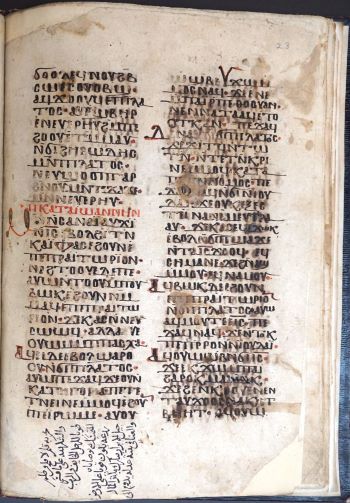Codex sa 292L, Oxford, BL, Huntington 5 is a partially extant Sahidic Coptic Holy Week Lectionary consisting of a first longitudinally torn half folio and another 36 folios. Apart from the main texts written in Coptic, the codex contains short Arabic headings, an extended Arabic instruction addressed to the congregation, and a seven-line marginal note written in Arabic at the bottom of one of the folios (f. 23r, reproduced at the end of this blog entry). The examination of this marginal note yielded an unexpected result. The marginal note turned out to be the unique example of an elaborate Arabic probatio pennae (pen trial) in a Coptic manuscript.

The genre of probationes pennae or pen trials is encountered in innumerable manuscripts and in more than one tradition. It materializes on flyleaves or in marginalia in a great variety of forms, including jottings, catchwords, or nonsensical words. In the European medieval tradition, when trying their pen, scribes resorted also to miniatures, caricatures, or simply wrote the words probatio or probatio pennae, always in Latin, sometimes accompanied by more text not necessarily in Latin. My research on manuscripts originating from the medieval Middle East unveiled an additional particularity in the pen trial occurrences. The Hebrew pen trial tradition features a rhyme-property with several examples of pen trial texts in rhyming verses, which seems to be lacking in the European medieval pen trial tradition. The Hebrew pen trial tradition seems to find its pendant in Arabic, therefore allowing us to speak of a Semitic tradition. In examples produced in the Middle Eastern region, the words ‘pen trial’, in Arabic taǧribat qalam, or similar formulae are always the first words of two hemistichs ending with a perfect rhyme. In this tradition, while the second hemistich invariably includes the words lā falaḥ or lā aflaḥ man ẓalam ‘may he who acted wrongfully not succeed’, the first hemistich may use the noun qalam ‘pen’ rhyming it with the verb ẓalam ‘(he) did wrong or acted wrongfully’, or variants with the words ḥibr or midād ‘ink’ instead of pen, evidently triggering other rhyming end words. A fourth pen trial tradition might be worth mentioning. It is the Judeo-Arabic one which is well represented in the Cairo Genizah fragment collection in Cambridge. An examination of the collection showed dozens of occurrences of the Arabic words תגרבה taǧribah ‘trial’, קלם תגרבה taǧribah qalam ‘pen trial’ and even חבר תגרבה taǧribah ḥibr ‘ink trial’ written in Hebrew characters, however lacking a second rhyming hemistich.
To come back to the seven-line marginal note in the manuscript at issue, the first line of the probatio pennae follows the above-mentioned formulaic Arabic pen trial, rhyming qalam with ẓalam. Yet diverging from the Arabic pen trial tradition, the scribe adds a second verse, ending with qasam ‘(he) gave’ (lit. ‘he allocated’), a procedure that is not found among the samples of Arabic (and Judaeo-Arabic) pen trials, in which the formulaic verse usually appears on its own. The scribe drives the innovation further by adding the first three verses of chapter 111 of the Septuagint Psalter. The latter have turned out to be interesting by themselves, being taken from an Arabic Bible tradition based on a translation from the Syriac Peshitta. The search for representatives of the Arabic taǧribat qalam tradition has yielded many examples of both Muslim and Jewish manuscripts; so far, codex sa 292L seems to feature the first occurrence discovered in a Christian manuscript. The pen trial was most probably written by an anonymous Coptic scribe with a sophisticated knowledge of Arabic at a time when codex sa 292L had ceased to be in liturgical use.
For more details on what seems to be the first known example of an Arabic pen trial in a Coptic manuscript, see my article in the Journal of Coptic Studies 22 (2020), 69–93.
Ms. sa 292L, f. 23r: Coptic text with Arabic probatio pennae

© Malte Rosenau. Published with the kind permission of the Bodleian Library
 Blogs
Blogs  Recent Bloggers
Recent Bloggers 




